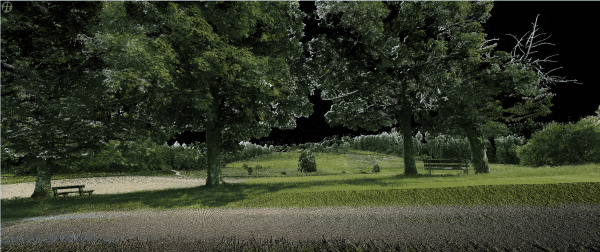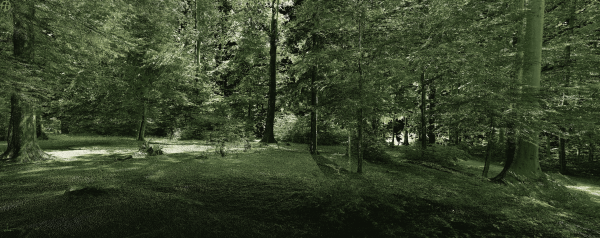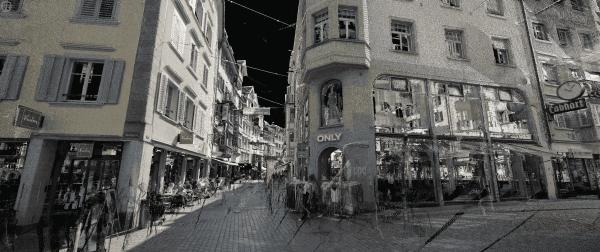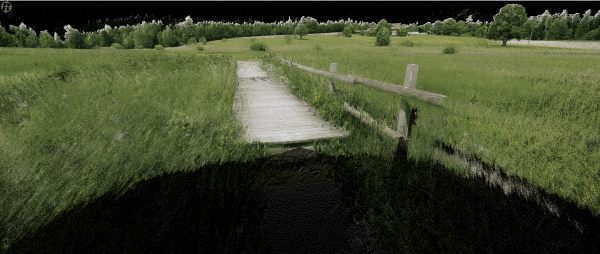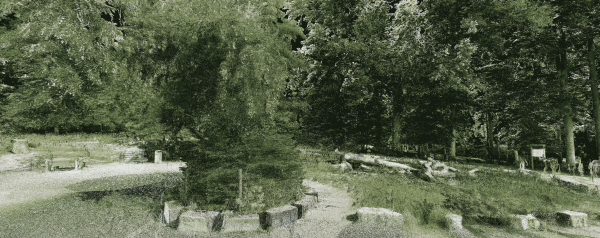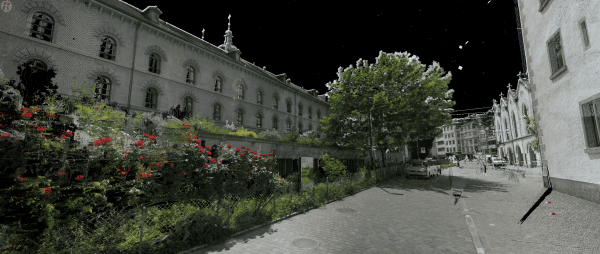REGaitVR
Restorative Landscape Environments for Gait Therapy with VR


Background
Therapies to improve gait security in the context of rehabilitation should be designed as close to everyday life as possible so that patients can train activities of daily living. In this context, training in virtual reality (VR) is gaining increasing attention. Immersive VR simulations of real environments have great potential to be used for customised training in a controlled and safe environment.
Motivation and Goal
An innovative prototype was developed in collaboration between ETH Zurich and the therapy department of the Schaffhausen hospitals. Real urban environments were recorded with the help of laser scanners. The LiDAR (Light Detection and Ranging) data captured in this way was integrated into the game engine Unity (www.unity.com) and the scenes were made freely walkable with VR glasses. LiDAR data are dense 3D point clouds of physical surfaces that render precise three-dimensional models of landscapes. Audio recordings of ambient sounds were also integrated into the VR landscape, further enhancing the degree of reality and thus the immersion into the virtual world.
Patients see the virtual environment in the VR glasses (HTC Vive wireless). By walking in the physical space, they move through the virtual scene. In the process, various balance and dual-task exercises can be trained repeatedly. Initial tests with geriatric patients indicate that a further developed prototype could effectively complement conventional therapies.
The aim of the project «REGaitVR» is now to investigate how different immersive VR landscape environments (in the city, in the countryside, in the forest) influence the physical rehabilitation of geriatric patients, especially through their effect on recovery from stress. The factors identified will be used to integrate realistic landscapes specifically into digital VR applications for gait therapy in order to support training also through the perceived landscape.
Approach
The further development of the prototype is done in cooperation with experts in geriatric rehabilitation in the field of physiotherapy. Practical requirements for environments for VR gait therapy guide the selection of landscapes. These landscapes will then be integrated into VR applications. These applications will be used and tested together with therapists for VR gait therapy of older persons with general mobility impairments of varying severity in a controlled study.
Significance of the Project
The project will make an important contribution to adapting and improving the content for VR rehabilitation tools that support therapies for physically impaired elderly patients and improve their general well-being. Last but not least, it will «bring the landscape into the hospital», i.e. people with limited movement will be able to experience landscapes and benefit from their restorative effects.
Further Information
Impressions of the landscapes
Project Data
Project Team
Dr. Ulrike Wissen Hayek ETH Zürich, PLUS (Project Management)
Laura Schalbetter, ETH Zürich, PLUS (PhD student)
Fabian Gutscher, ETH Zürich, PLUS (Sound-Specialist)
Prof. Dr. Adrienne Grêt-Regamey, ETH Zürich, PLUS
Funding
ETH Research Grant (ETH-01-22-1)
Duration
January 2023 to December 2025
Contact
Dr. Ulrike Wissen Hayek ETH Zürich, PLUS
